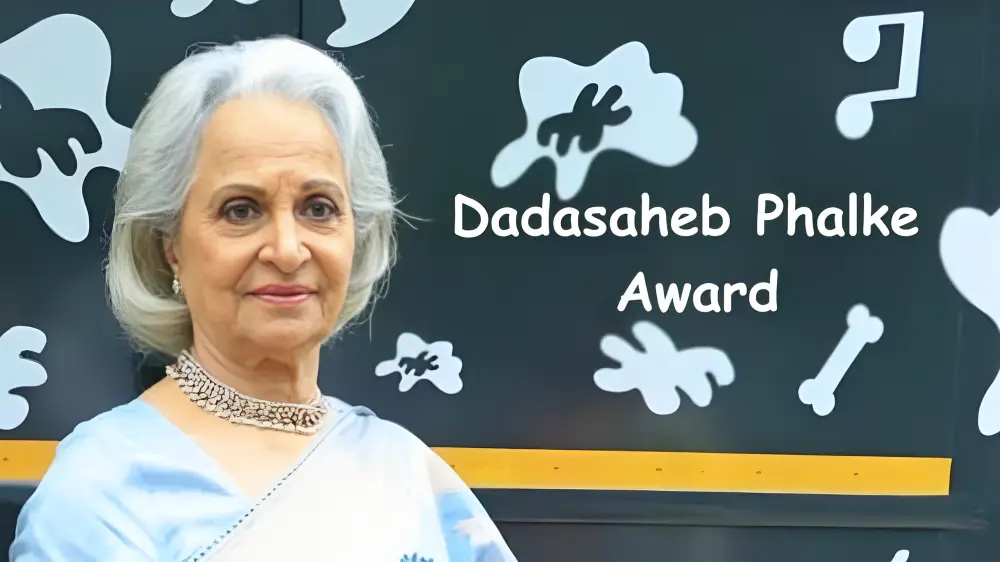Few figures in Indian movie history are as illustrious as Waheeda Rehman. She is a legend whose brilliance has spanned generations and who has not only adorned the silver screen but also left her mark on Indian movie history. Waheeda Rehman Dadasaheb Phalke Award Winner in appreciation of her priceless services. Let’s explore this illustrious actress’s life and career.
Waheeda Rehman Dadasaheb Phalke Award Winner
Waheed expressed her joy at winning this honor by saying, “I am pleased. This is a significant government award. Anurag Thakur, Minister of I&B, is to be thanked for it.
Therefore, despite having talent, they were silenced. “When I lived in Bangalore, I met a lot of individuals from other villages. Many of the people who used to work at my factory did not even know how to write their names; they signed the paperwork using their thumbs instead of a pen. However, once they knew, both of us were committed. Everybody can learn, and they should be given the opportunity; obtaining a BA or MBA is not required,” she added. “I think women have a lot of strength, a lot of brains, and they can be very successful if they work wholeheartedly,” she said in her conclusion.
Read also: Bloody Brothers
Waheeda Rehman Movie Journey
Rehman initially made her presence playing a role with dark overtones in CID (1956), another Dev Anand box office success, over ten years ago. In addition to Solva Saal (1958), one of the first Hindi film remakes of Frank Capra’s It Happened One Night (1934), the two stars also starred in a number of other B&W films, including Kala Bazar (1960) and Baat Ek Raat Ki (1962), which continue to draw seasoned viewers on YouTube and OTT platforms.
Guru Dutt, who introduced her to Hindi films and with whom she co-created some of her career’s most brilliant moments, produced CID. In Dutt’s Pyaasa (1957), she portrayed a prostitute who stands by a despondent poet, and in Kaagaz Ke Phool (1959), a girl who unintentionally becomes a star. She also produced Chaudhvin Ka Chand, one of the biggest songs of her career, with Dutt.
Other notable movies in her career include Satyajit Ray’s Abhijan (1962), in which she played the seductive Gulabi, Basu Bhattacharya’s Teesri Kasam (1966), in which she played the affable nautanki dancer, Khamoshi (1970), in which she played the sensitive nurse who only finds love in madness, and Reshma aur Shera (1971), for which she won the national award for best actress.
Dev Anand’s 100th birthday
On the occasion of her prize announcement on September 26, which also happened to be Dev Anand’s 100th birthday, she noted, “I started with Dev Saheb. He appeared alongside me in my first Hindi movie. I believe this was his 100th birthday present to me. Together, Dev Anand and Waheeda Rehman appeared in a number of movies, including Guide, Prem Pujari, Roop Ki Rani Choron Ka Raja, and Kala Bazar.
In addition, Waheeda Rehman won the Filmfare Award for Best Actress for the movie Guide, which Dev Anand produced and co-starred in. Over the course of her five-decade career, Waheeda Rehman has made appearances in over 90 movies. She has received three Filmfare Awards and a National Film Award. In 1972 and 2011, the Indian government gave her the Padma Shri and Padma Bhushan honors.
For her portrayal as a clanswoman in the crime drama Reshma Aur Shera, she won the National Film Award for Best Actress. Additionally, Waheeda Rehman was honored for her work with Guru Dutt on the movies Pyaasa, Kaagaz Ke Phool, Chaudhvin Ka Chand, and Sahib Bibi Aur Ghulam.
In 1962, she collaborated with renowned filmmaker Satyajit Ray on the Bengali movie Abhijan. In recent years, Waheeda Rehman’s performances have also been acknowledged in the box office successes of Rang De Basanti (2006) and ‘Delhi 6’ (2009) by Rakesh Omprakash Mehra.
Anurag Thakur, the information minister, previously announced Waheeda Rehman as the recipient of the Dadasaheb Phalke Award and cited some of her outstanding efforts. The Hindi films Pyaasa, Kaagaz Ke Phool, Chaudhari Ka Chand, Saheb Biwi Aur Ghulam, Guide, Khamoshi, and many others stand out as examples of Waheeda ji’s outstanding acting in these films. Award-winning Padma Shri and Padma Bhushan recipient Waheeda ji, “has demonstrated dedication, commitment, and the strength of a Bharatiya Nari who can achieve the highest level of professional excellence with her hard work,” he wrote in a post on X.
FAQs-
Q1. Who was the first person to win the Dadasaheb Phalke Award?
Actress Devika Rani, who was recognized at the 17th National Film Awards, was the inaugural winner of the prize.
Q2. Who among these was Honoured with the Dadasaheb Phalke Award?
Some prominent prize recipients include well-known individuals like Satyajit Ray, Nagi Reddy, Raj Kapoor, Lata Mangeshkar, Akkineni Nageswara Rao, Dilip Kumar, Sivaji Ganesan, and Asha Bhosle.
Q3. Who is regarded as the founding figure of Indian cinema?
Dadasaheb Phalke, also known as Dhundiraj Govind Phalke, was an Indian film director who is regarded as the founder of Indian cinema. During the British Raj, he was born on April 30, 1870, in Trimbak, British India (now Maharashtra, India). He passed away on February 16, 1944, in Nashik, Maharashtra.
Q4. Who is the biggest award in India?
The Bharat Ratna, India’s highest civilian honor, was established in 1954. There are no restrictions on race, profession, position, gender, or religion when it comes to this prize. It is given in appreciation for very good work or performance in any area of human endeavor.
Q5. Who was the first film?
Raja Harishchandra (1913), India’s first full-length feature film, was directed by Phalke (1870–1944), an Indian filmmaker who is referred to as the “Father of Indian Cinema” and is well-known for doing so. had commanded.

